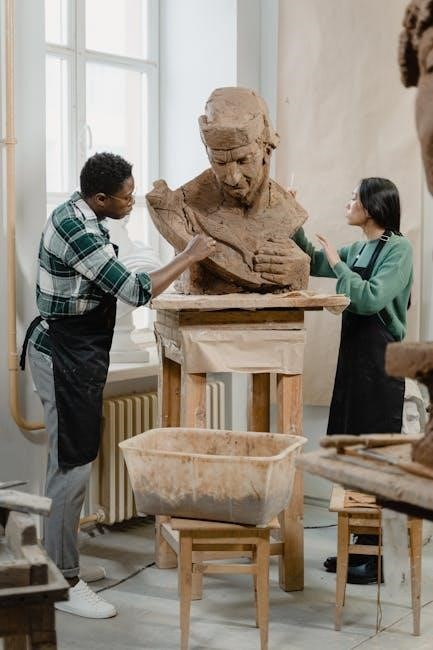Role and Responsibilities of the Dean of Instruction
The Dean of Instruction oversees academic programs, ensuring curriculum quality and alignment with institutional goals. They manage faculty development, support student success initiatives, and promote a culture of excellence and innovation.
1.1 Overview of the Dean’s Position
The Dean of Instruction serves as a senior academic leader responsible for overseeing the educational mission of an institution. This role involves strategic planning, curriculum development, and faculty support to ensure academic excellence. The dean collaborates with administrators, faculty, and staff to align programs with institutional goals and student needs. They also play a key role in fostering innovation, maintaining academic standards, and promoting a supportive learning environment. Their position is central to driving the institution’s academic vision and operational effectiveness.
1.2 Key Duties and Expectations
The Dean of Instruction is expected to lead academic planning, manage budgets, and evaluate program effectiveness. They facilitate faculty development through workshops and mentorship, ensuring instructors stay updated on best practices. The dean also collaborates with other departments to align resources with institutional objectives, fostering a cohesive academic environment. Additionally, they address student concerns, promote diversity and inclusion, and ensure compliance with accreditation standards. Their role demands strong leadership, communication, and problem-solving skills to drive academic success and institutional growth effectively.

Importance of the Dean of Instruction in Educational Institutions
The Dean of Instruction plays a vital role in maintaining high academic standards, supporting faculty development, and enhancing student success, contributing significantly to institutional effectiveness and reputation.
2.1 Impact on Academic Quality and Standards
The Dean of Instruction ensures the development and implementation of rigorous academic programs, maintaining high educational standards. They oversee curriculum design, assess teaching effectiveness, and foster innovation in instructional methods. By promoting evidence-based practices and aligning programs with industry needs, the Dean enhances the quality of education. This role is crucial in ensuring that graduates are well-prepared to meet the demands of their fields, thereby upholding the institution’s reputation for excellence.
2.2 Role in Faculty Development and Support
The Dean of Instruction plays a pivotal role in fostering faculty growth and development. They implement professional development programs, mentorship initiatives, and resources to enhance teaching and research capabilities. By encouraging collaboration and innovation, the Dean supports faculty in staying current with educational trends and best practices. This role also involves recognizing faculty achievements and addressing challenges, ensuring a motivated and effective academic workforce.

Skills and Qualifications Required
A Dean of Instruction must possess strong leadership, strategic planning, and communication skills. They need a master’s or doctoral degree, academic experience, and the ability to foster innovation and collaboration.
3.1 Educational Background and Experience
A Dean of Instruction typically holds an advanced degree, such as a master’s or doctoral degree, in education or a related academic discipline. They often have significant academic experience, including teaching, curriculum development, and leadership roles. Many deans begin as faculty members, progressing through administrative positions like department chair or associate dean. Their background should demonstrate a deep understanding of pedagogical practices, institutional operations, and strategic planning. Experience in fostering collaboration and driving academic innovation is also essential for success in this role.
3.2 Leadership and Communication Skills

Effective leadership and strong communication skills are critical for a Dean of Instruction. They must inspire faculty, foster collaboration, and clearly articulate the institution’s academic vision. Deans should possess excellent interpersonal abilities to engage with students, staff, and stakeholders. Strong listening and problem-solving skills are essential for addressing challenges and mediating conflicts. Proficiency in both verbal and written communication ensures seamless coordination of academic initiatives and alignment with institutional goals. These skills enable the dean to lead by example, promoting a culture of transparency and shared responsibility.

Appointment and Tenure Process
The appointment of a Dean of Instruction involves a rigorous selection process, including candidate evaluation, interviews, and final approval by the institution’s governing body. Tenure is typically granted after demonstrating exceptional performance over several years.
4.1 Selection Criteria and Process
The selection of a Dean of Instruction involves a thorough evaluation of candidates based on academic credentials, leadership experience, and communication skills. A search committee, often assisted by external firms, identifies and screens potential candidates. The process typically includes interviews with faculty, staff, and stakeholders to assess fit and vision. Final candidates may present strategic plans or participate in on-campus interviews. The governing body approves the appointment, ensuring the chosen candidate aligns with the institution’s mission and goals for academic excellence.
4.2 Tenure and Performance Evaluation
The Dean of Instruction typically undergoes a performance evaluation process to assess their effectiveness in leading academic initiatives and fostering institutional growth. Tenure decisions are often based on demonstrated leadership, faculty support, and alignment with strategic goals. Evaluations may include feedback from faculty, staff, and students, as well as measurable outcomes such as improved academic standards or increased student success rates. Accountability and continuous improvement are key components of the evaluation process, ensuring the dean remains aligned with the institution’s objectives and adapts to evolving educational needs.

Challenges Faced by the Dean of Instruction
Deans must balance administrative tasks with academic oversight, manage limited resources, and adapt to changing educational trends while maintaining faculty morale and student engagement effectively.
5.1 Balancing Administrative and Academic Duties
The Dean of Instruction often faces the challenge of balancing administrative responsibilities with academic oversight. Managing budgets, supervising staff, and ensuring compliance with policies can be time-consuming, leaving limited time for direct involvement in curriculum development or faculty mentorship. This dual role requires strong organizational and time management skills to ensure both administrative efficiency and academic excellence. Striking this balance is crucial for maintaining institutional effectiveness and fostering a supportive learning environment.

5.2 Adapting to Changing Educational Trends
The Dean of Instruction must stay attuned to evolving educational trends, such as the integration of technology and innovative teaching methods. They play a crucial role in identifying emerging trends and guiding the institution’s adaptation to maintain academic relevance. This involves fostering a culture of innovation, collaborating with faculty to implement new strategies, and ensuring resources are effectively allocated. By staying proactive, the Dean helps the institution remain competitive and aligned with modern educational standards, ultimately enhancing student outcomes and institutional success.

Impact and Legacy of Effective Leadership
Effective leadership by the Dean of Instruction fosters institutional growth, enhances academic quality, and inspires innovation, leaving a lasting legacy that shapes the future of education and student success.
6.1 Contribution to Institutional Growth
The Dean of Instruction plays a pivotal role in driving institutional growth by fostering a culture of innovation, collaboration, and excellence. They champion strategic initiatives that align with the institution’s mission, ensuring resources are allocated effectively to enhance academic programs and support services. By promoting faculty development and student success, the Dean contributes to the institution’s reputation, attracting top talent and fostering long-term sustainability. Their leadership ensures the institution remains competitive and adaptable in a rapidly evolving educational landscape, leaving a lasting impact on its growth and legacy.
6.2 Influence on Student Success and Outcomes
The Dean of Instruction significantly impacts student success by implementing policies and resources that enhance learning experiences. They foster a culture of innovation, ensuring access to cutting-edge tools like AI detection for academic integrity. By supporting faculty in adopting effective teaching strategies, the Dean indirectly benefits students through improved instruction. Their efforts to align curriculum with industry demands prepare students for future challenges. This leadership not only boosts academic performance but also equips students with skills needed for lifelong success, making the Dean a key driver of positive educational outcomes and institutional reputation.

Future Trends and Innovations
The Dean of Instruction will increasingly integrate technology, fostering innovation in curriculum design and teaching methods. AI tools and digital platforms will enhance learning experiences, ensuring students remain competitive.
7.1 Integration of Technology in Instruction

The integration of technology in instruction is a key focus for the Dean of Instruction, enhancing accessibility and personalizing learning experiences. AI tools, such as Turnitin’s AI detection, help ensure academic integrity while fostering innovation. The Dean promotes the use of digital platforms and learning management systems to streamline curriculum delivery and support faculty in adopting modern teaching methods. This approach ensures students develop essential skills for a tech-driven world, preparing them for future challenges and opportunities in education.
7.2 Evolving Role in Modern Education
The Dean of Instruction’s role is evolving to address changing educational trends and student needs. They now focus on fostering innovation, supporting diverse learning styles, and ensuring equitable access to education. By leveraging technology and data-driven strategies, the Dean helps institutions adapt to global challenges and prepares students for future careers. This shift emphasizes leadership in curriculum development, faculty support, and community engagement, ensuring the Dean remains a pivotal figure in driving educational progress and maintaining institutional relevance in a rapidly changing world.

Leave a Reply